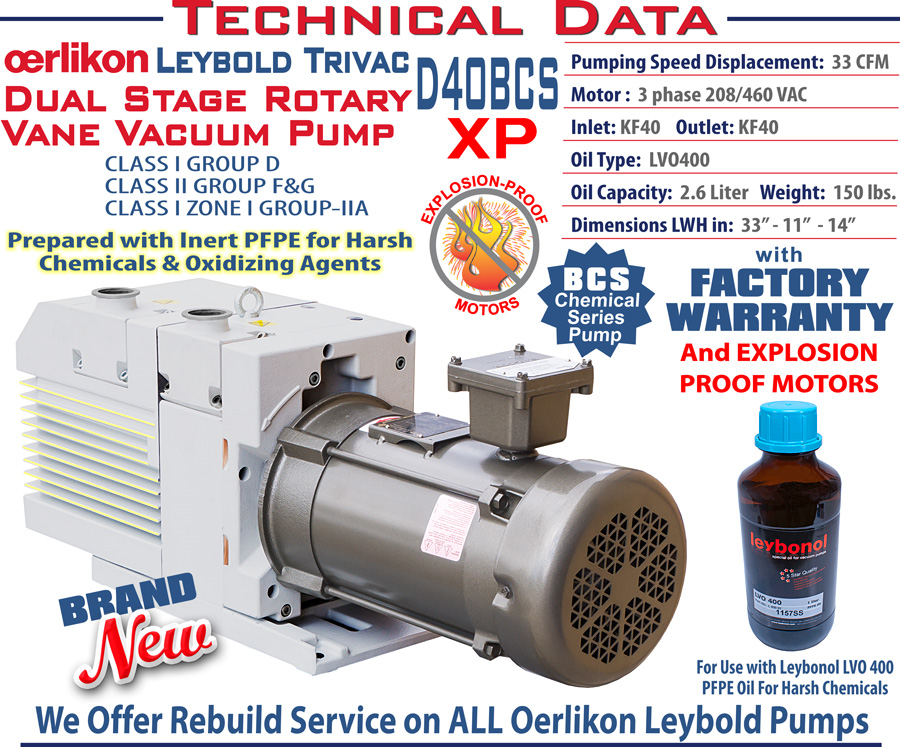NEW Leybold D40BCSXP Explosion Proof Chemical Series BCS Trivac Rotary Vane Mechanical Vacuum Pump
Prepared With Inert PFPE Oil, 33 CFM, 3-Phase, 208-230/460 VAC 60 Hz, 200-220/380 50 Hz, NEMA
These new Leybold D40BCSXP Explosion Proof Chemical Series Trivac vacuum pumps include an explosion proof motor and are specially prepared for operation with chemically inert LVO-400 PFPE vacuum oil. These industrial-grade BCSXP chemical series vacuum pumps use synthetic PFPE lubricants which offer superior resistance to harsh chemicals and oxidizing agents. These Leybold D40BCSXP PFPE prepared rotary vane vacuum pumps have an excellent ultimate pressure down to 1x10-4 Torr and are commonly used for pumping of corrosive and aggressive gaseous media, including applications like, backing turbomolecular pumps, backing diffusion pumps, backing roots pumps, regenerating cryo pumps, rotary evaporation, refrigeration system evacuation, epoxy degassing, vacuum sterilization, backing mass spectrometers, freeze drying, vacuum centrifugal applications, vacuum distillation, space research, and other vacuum processes. These Leybold D40BCSXP PFPE chemical BCSXP vacuum pumps have a high pumping speed displacement of 33 CFM and require 3-Phase 208-230/440-480 VAC 60 Hz input power.
These Leybold D40BCSXP Trivac vacuum pumps can be fitted with a variety of optional accessories. These include the CFS (chemical filter with safety isolation valve), ARS (exhaust filter with lubricant return), IGS (inert gas system), LSS (limit switch system), and EIS (electrical indicator system) make the TRIVAC BCSXP a superior chemically inert vacuum pumping system. These BCSXP vacuum pumps are new, typical stocked in inventory, and ship with manufacturers 1-year factory direct warranty. Parts, oil, and all optional accessories for these pumps are located for easy purchase on this website. The complete operating and instructions manual can be downloaded in PDF format below.
Explosion Proof Motor Specifications (XP Class, Group, & Division)
- Class I, Group D
- Class II, Group F & G
- Division I
Typical Customer Applications That Are In Class I Environments
(Flammable Gases & Vapors) Include:
- Spray painting and finishing areas
- Utility gas plants
- Petroleum refining plants
- Petroleum dispensing locations
- Dry cleaning facilities
- Dip tanks containing combustible or flammable fluids
- Plant facilities extracting solvents
- Inhalation anesthetic areas
- Process facilities manufacturing or using nitro-cellulose (class II as well).
- Aircraft hangars and fuel servicing areas.
- Gas stations.
Typical Customer Applications That Are In Class II Environments
(Combustible Dust) Include:
- Flour mills.
- Feed mills.
- Grain elevators and grain handling facilities.
- Fire work plants and storage areas.
- Aluminum manufacturing and storage areas.
- Magnesium manufacturing and storage areas.
- Coal preparation and handling facilities.
- Starch manufacturing and storage areas.
- Confectionary plants.
- Pulverized sugar and cocoa manufacturing plants. Packaging and
storage plants.
- Spice grinding and storage plants.
These explosion proof BCSXP rotary vane vacuum pumps include an electrically sealed explosion proof motor. These explosion-proof motors are designed to limit the chance a spark from inside the motor could travel outward to ignite air born flammable vapors or materials in the laboratory where the pump is operating. Explosion proof vacuum pumps are typically needed in applications where flammable materials may accidentally leak into the room air where these pumps are used. Explosion Proof vacuum pumps are
NOT designed to evacuate vapors and gas mixtures which are explosive if ignited.
When the vacuum pump is used to pump flammable gases you must keep a closed air tight system by:
- Not opening the gas ballast, opening the gas ballast could cause air (O2) to enter the pump.
- Ensuring the foreline inlet and exhaust outlet are leak tight to avoid flammable gas leakage into the atmosphere or air (O2) from entering the pump housing.
- Using only an inert gas like Nitrogen (N2) at the gas ballast to purge or dilute harmful gases being pumped.

